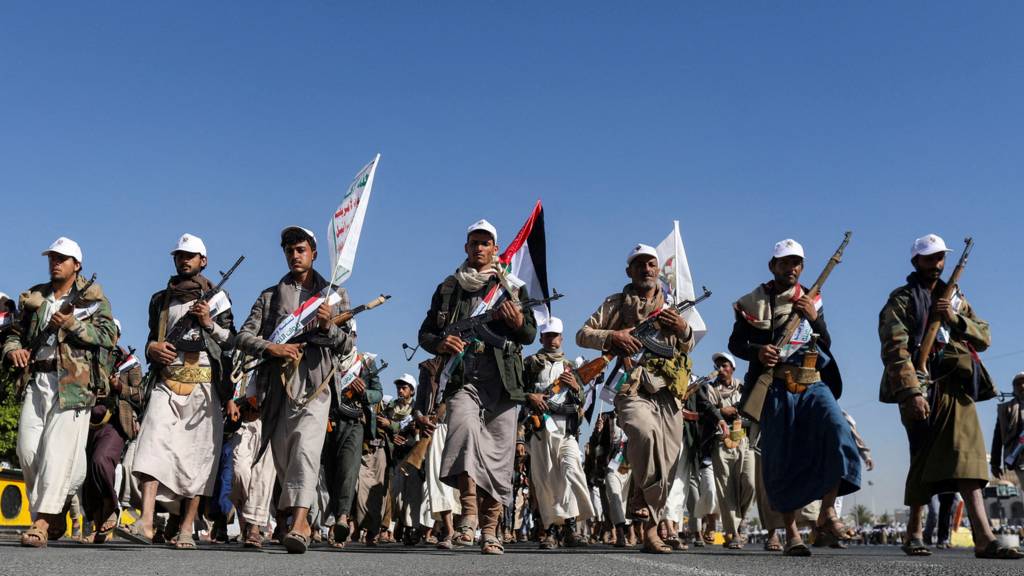


The United States has launched airstrikes targeting underground weapons storage facilities controlled by Iran-backed Houthi rebels in Yemen. This marks the first time advanced B-2 Spirit stealth bombers have been used in the conflict. The Pentagon confirmed that five Houthi facilities were struck, with US Defence Secretary Lloyd Austin stating that these facilities were used to house conventional weapons that posed a threat to civilian and military vessels in the Red Sea and Gulf of Aden. The deployment of these bombers showcases the capabilities and commitment of the US to address security threats in the region.
B-2 Stealth Bombers Target Houthi Weapons Facilities in Yemen
The United States has launched airstrikes targeting underground weapons storage facilities controlled by Iran-backed Houthi rebels in Yemen. This marks the first time advanced B-2 Spirit stealth bombers have been used in the conflict.
The Pentagon confirmed that five Houthi facilities were struck, with US Defence Secretary Lloyd Austin stating that these facilities were used to house conventional weapons that posed a threat to civilian and military vessels in the Red Sea and Gulf of Aden.
The deployment of these bombers showcases the capabilities and commitment of the US to address security threats in the region.
Background
The Houthi movement is a Shia rebel group that has been fighting against the internationally recognized government of Yemen since 2014. The group has received support from Iran, which has provided weapons and training.
In recent months, the Houthis have launched a series of attacks on Saudi Arabia and the United Arab Emirates. This has led to an escalation of tensions in the region.
The US has been providing support to the Saudi-led coalition that is fighting against the Houthis. This support has included airstrikes, intelligence sharing, and logistical assistance.
FAQs
1. Why did the US use B-2 stealth bombers in this attack?
The B-2 stealth bomber is a highly advanced aircraft that is capable of penetrating enemy air defenses and delivering precision strikes. The use of these bombers in this attack demonstrates the US's commitment to addressing security threats in the region.
2. What is the significance of this airstrike?
This airstrike is significant because it is the first time that the US has used B-2 stealth bombers in Yemen. It also marks a significant escalation of the US's involvement in the conflict.
3. What are the potential consequences of this airstrike?
The airstrikes could lead to an escalation of violence in Yemen. The Houthis may retaliate against Saudi Arabia or the UAE. The airstrikes could also damage the diplomatic efforts that are underway to resolve the conflict.
4. What is the US's role in Yemen?
The US has been providing support to the Saudi-led coalition that is fighting against the Houthis. This support has included airstrikes, intelligence sharing, and logistical assistance.
5. What is the future of the conflict in Yemen?
The conflict in Yemen is likely to continue for some time. The Houthis are a well-organized and determined group. The Saudi-led coalition is also well-equipped and has the support of the US. It is unclear how the conflict will end.

The FBI announced the arrest of Cindy Rodriguez Singh, one of its 'top 10 most wanted fugitives', from India in connection with the murder of her six-year-old son. She was charged with Unlawful Flight to Avoid Prosecution and Capital Murder. Patel commended the Indian and US agencies for their coordination in the case and noted that this is the fourth '10 Most Wanted' fugitive arrested in the past seven months. Singh's son had severe health and developmental issues and she allegedly fled to India to avoid prosecution, but justice knows no borders and the FBI never gives up on those who harm the innocent.

In a significant move, the descendants of Netaji Subhas Chandra Bose have urged Prime Minister Narendra Modi to institute a tradition of hoisting the National Flag at the Red Fort every year, to commemorate the establishment of the Azad Hind Government on October 21. The Azad Hind Government, formed under Netaji's leadership, played a key role in the fight for India's independence during World War II. With the 82nd anniversary of its establishment approaching, this request holds even more significance in honoring the sacrifices made by the Azad Hind Fauj.

Prime Minister Narendra Modi spent Diwali in an unconventional manner, celebrating the festival of lights with Indian Navy personnel onboard the aircraft carrier INS Vikrant. During his visit, Modi praised the INS Vikrant as a symbol of Aatmanirbhar Bharat and also witnessed a stunning air power demo by MiG 29K fighter jets taking off and landing on the short runway of the aircraft carrier. Modi was also deeply moved by a special cultural performance by the sailors, dedicated to the success of the Indian Armed Forces. He ended the evening by joining in the tradition of Bara Khana with the naval personnel. On the next day, Modi joined a yoga session on deck and watched a spectacular steampast of warships and flypast by aircraft.

Indian Prime Minister Narendra Modi celebrated Diwali with Navy personnel on the country's new aircraft carrier, INS Vikrant. He extended Diwali greetings to the nation and shared highlights from his visit, including an air power demonstration and cultural program. PM Modi also addressed the significance of Diwali and expressed his best wishes to the families of the Navy personnel.

In a tense meeting at the White House, President Donald Trump urged Ukrainian President Volodymyr Zelensky to accept Russian President Vladimir Putin's terms for ending the two-year war in Ukraine. Despite seeking more military support from the US, Zelensky was met with resistance from Trump, who reportedly engaged in a "screaming match" with the Ukrainian leader. The US leader even claimed that Putin saw the conflict as a "special operation" rather than a full-fledged war, further complicating negotiations between the two nations.

As Liverpool struggled to find their form in a tough game against Manchester United, Dutch midfielder Cody Gakpo stood out with his sharp attack and strong composure. Despite hitting the woodwork three times, Gakpo managed to score a brilliant equalizer for his team, showcasing his potential and talent on the field. While Liverpool may have lost the match, Gakpo's impressive performance provided a glimmer of hope for a struggling team.

Ayodhya's Deepotsav 2025 was a shining example of faith, community, and innovation as the city set two new world records with over 26 lakh diyas and a grand aarti performed by 2,100 priests. The event, witnessed by Chief Minister Yogi Adityanath, also showcased a spectacular 3D projection mapping and drone light show that brought Lord Ram's story to life in the night sky. The event was a testament to the deep connection Ayodhya's youth have with Lord Ram's ideals and was made possible by the hard work of over 40 potter families and thousands of volunteers.

In a brazen and perfectly orchestrated robbery, a group of thieves infiltrated the world-famous Louvre Museum in Paris on Sunday morning and made off with a collection of priceless jewels with an estimated value in the millions. French officials confirmed the robbery and began a detailed investigation to determine how the culprits managed to evade the museum's advanced security systems and execute the crime in under seven minutes. This latest incident has raised serious concerns about the protection of national treasures at one of the world's most popular tourist destinations.

In an audacious heist, a group of armed thieves breached security at the iconic Louvre Museum in Paris and stole nine valuable jewels from the collection of Napoleon Bonaparte and Empress Joséphine. The robbery, which took place in just seven minutes, has prompted a full-scale police investigation and raised concerns about the museum's security. French officials are working to recover the stolen items, but the Louvre remains closed to visitors.

Despite a ceasefire in early October, the conflict between Israel and Palestine shows no signs of abating, with reports of ongoing deadly clashes and Israeli tank fire targeting a car in Gaza City. The closure of the Rafah border crossing to Egypt, citing Hamas's failure to retrieve bodies, has further exacerbated tensions. However, experts warn of the uncertain future for a transitional government in Gaza and the risk of breaching the fragile ceasefire. The violence and closure highlight the ongoing humanitarian crisis and the need for both sides to engage in peaceful negotiations.